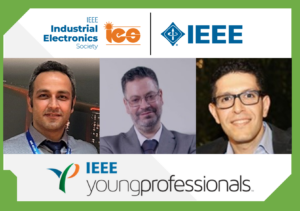[S/YP webinar] Electric Vehicle Smart Charging and Infrastructure
Friday 24 May 2024 at 7:00 AM PDT, 10:00 AM EST, 4:00 PM CET
By Hani Vahedi (TU Delft, Netherlands), Mohamed Trabelsi (Kuwait College of Science and Technology, Kuwait) and Maziar Mobarrez (Google, USA)
Joint Webinar with IEEE IES Students and Young Professionals Activity Committee (S&YP)
Register now using the link below:
https://attendee.gotowebinar.com/register/8984584937886219864
Abstract:
As the automotive industry continues its shift towards sustainable transportation, electric vehicles (EVs) have emerged as a promising solution to reduce greenhouse gas emissions and dependence on fossil fuels. However, the widespread adoption of EVs necessitates a robust and smart charging infrastructure to support their growth. Moreover, developing bidirectional DC chargers enables EVs to act as energy storage systems featuring Vehicle-to-Grid and Vehicle-to-Load, which help shape the peak load during rush hour or provide backup power during interruption. This webinar delves into the evolving landscape of EV charging infrastructure, exploring key aspects such as technology advancements and infrastructure deployment strategies. From traditional charging stations to innovative fast-charging solutions and smart grid integration, we examine the latest trends and industry developments shaping the future of EV charging.
Presenters’ bio:
Hani Vahedi (Senior Member, IEEE) is currently an assistant professor at TU Delft, where he is working toward the electrification of industrial processes. He is the inventor of the PUC5 converter, holds multiple US/world patents, and transferred that technology to the industry, where he developed the first bidirectional electric vehicle DC charger based on his invention. His research interests include multilevel converter topologies, control and modulation techniques, and their applications in the electrification of industrial processes and clean energy transition, such as smart grids, renewable energy conversion, electric vehicle chargers, green hydrogen production (electrolyzers), and fuel-cell systems.
Mohamed Trabelsi (IEEE M’10-SM’18) received the B.Sc. degree in Electrical Engineering from INSAT, Tunisia in 2006, M.Sc. in Automated Systems and Ph.D. in Energy Systems from INSA Lyon, France in 2006 and 2009 respectively. From October 2009 to August 2018, he has been holding different Research positions at Qatar University and Texas A&M University at Qatar. In September 2018, he has joined Kuwait College of Science and Technology as an Associate Professor where he is currently a Full Professor and Head of the Electronics and Communications Engineering Department. His research interests include Control Systems with applications arising in the contexts of Power Electronics, Energy Conversion, Renewable Energies Integration, and Smart Grids.
Maziar Mobarrez holds M.Sc. and Ph.D. degrees in electrical engineering, with a specialization in power electronics, from Chalmers University of Technology (Sweden) and North Carolina State University (FREEDM Systems Center), respectively. Currently, he serves as a Sr. Power Engineer and Technical Lead at Google, leading multiple Rack-Level Power delivery system projects. His work ensures exceptional cost-efficiency, high performance, and power delivery for AI/ML applications.
Prior to Google, Maziar’s power converter development expertise led to contributions in major products across e-mobility and data center sectors. Notable achievements include work on Rivian’s DC fast charger, ABB’s MegaFlex UPS, and Infineon’s Hybrid KIT Drive.


